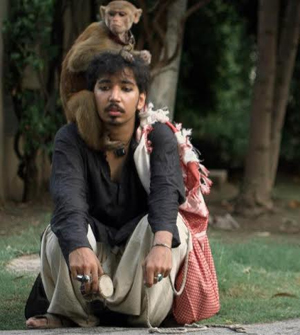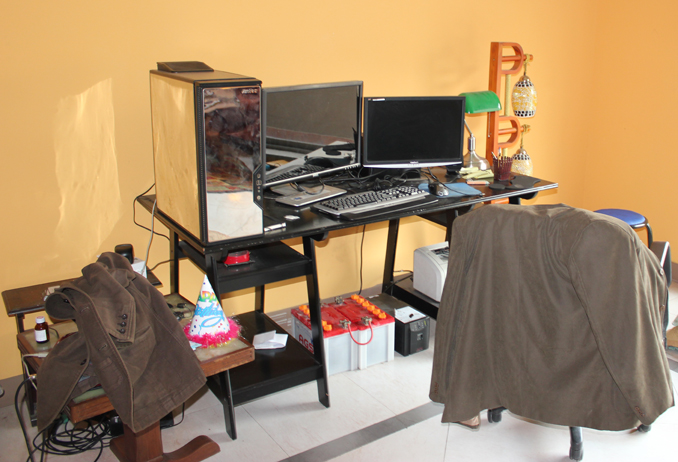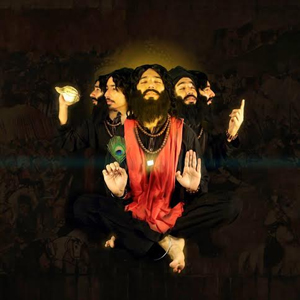Written by: Adeel Wahid - Posted on: January 08, 2014 |  Comments | 中国 (Chinese)
Comments | 中国 (Chinese)
Google Translation: اُردو | 中文
When a toddler tries to walk for the first time, it falls. It is only by putting in repeated effort despite initial failure that it finally begins to find its feet. Taimoor Salahuddin aka Mooroo uses this analogy to explain his own experience of “finding his feet” in music and direction.
“I was depressed, almost suicidal back in high school”, Mooroo candidly relates. “I was small and bullied by larger boys”. This is hard to believe coming from a person who can effortlessly make people laugh till they’re in tears; his friends and family want him to explore his potential as a standup comedian, and encourage him to record comedy skits for social media.
Mooroo attended the prestigious Aitchison College, an experience that he insists he does not cherish. Till fifth grade, he did pretty well in school, but by then he began to lose interest. This led to him being moved to the H section, reserved for students with the worst academic performance and disciplinary issues. “It does not make much sense to have all the kids not doing well at school to be herded together,” Mooroo says. “It is a complete trap for a kid, leaving little hope for him.”
Music was a relief, an escape, for young Mooroo. He began to express his sensitivities through music and would lock himself in his room listening to it when he should have been studying. It made him feel alive. This is one of the reasons he pursued music, because his own firsthand experience convinced him that music is capable of elevating people’s spirits, creating in them the desire to live, to forget their worries while they enjoy the melody and lyrics of a track.
 |
At first, a child learning to speak is only capable of generating incoherent words, but by experimenting with different sounds it eventually reaches at a point where it begins to pick up language. This process, Mooroo explains, is what can be used to help understand the way music is created. “I am intuitive with my voice and I keep experimenting in different ways to find the right mix for my songs.” This is perhaps the reason why his songs are different from conventional songs of mainstream artists; he spends a lot of time bringing in different sounds that can best create and transmit the emotion and feelings he wants to induce in his listeners.
“There is no fixed pattern when creating a song; it could happen in any sequence; whether it’s melody, beat, emotion or lyrics, any of them could come first, stimulating the process that gives birth to a finished music piece.”
I ask how he came to be known as Mooroo and he tells me it was his toddler sister who gave him the nickname, a name that has become his identity. ‘Taimoor’ was a difficult word for his sister to pronounce properly and she could only call him ‘Moor’; that eventually became ‘Mooroo’.
Growing up, Mooroo was adept with computers and technology and got himself enrolled for the computer science program at Simon Fraser University in British Columbia, Canada. It took him a year to fully realize that he yearned to do music. “I could gather audiences there in Canada whenever I played,” he relates, “and I figured that this is my calling in life”.
It was not easy to convince his parents though, both of whom owned businesses. But after six months of his emotional blackmailing they gave in. Mooro then applied to Full Sail University in Florida to study film making, where exposure from other artists helped polish his skills as a musician. He laughs recalling how on graduation his father had had a hard time believing that his son had finally received a degree!
Despite having greater opportunities in the US in filmmaking and music, Mooroo decided to return to his homeland. “I have to be here for my parents, all my friends are here, all the love and warmth is here. I am from here and this is who I am”, he says. And he quotes Mira Nair, one of his favorite Indian directors: "If we don't tell our stories, no one else will!" By identifying with his roots, he finds himself at home, providing that original and genuine spirit which often finds its ways in his songs and videos.
He came out with his first single Patakhi Larki in 2011, which was also his first stint at mainstream video making. Meanwhile he tried to create a band often performing with a few here and there but it did not work out. Though he played regularly with Zahir Ali (bass) and Valeed Zaman (drums), covering songs of musicians in and around Lahore.
Mooroo wanted to prove to his family that he could create a living for himself with his own craft and skills. So he began producing prolific work making songs and videos for various bands and individual artists alike, along with doing shoots for commercials. He is now the Managing Director of a production company, Aflatoon Studios, housed in Karachi, which employs a staff of five and has already produced videos such as Jimmy Khan’s Aisay Kaisay and Talal Qureshi’s Clubbing in Multan.
 |
| Where the magic happens |
In his journey as a musician, he has created inspiring singles such as Tere Bina and Tasveer, which have become very popular with the youth. His Awaam with Faris Shafi, with its bold critique on Pakistan’s situation, has received much appreciation from audiences and has gotten him reviews in major newspapers. The Tere Bina video has been called one of the best videos to have come out in 2013, by Dawn.
It has taken a lot of effort and persistence to reach to a point where he is able to pay his bills with his music alone now. There are international production houses showing interest in Mooro’s music and he is one of the three artists to be associated with Coke Studio Gigs which will give him the opportunity to perform all across Pakistan. He and Talal Qureshi have also produced the music for a mobile gaming studio, Frag Games, looking over the audio part of the company’s forthcoming gaming project. Then, he has recently made a documentary for Pak Oasis for their Corporate Social Responsibility (CSR) work of water installation plants in the rural part of Sindh. In the pipeline is also a video coming out for a Canadian band, Naqsh, which is going to focus on the remnants of Sikh and Hindu culture in Lahore.
 |
Even though some of Mooroo's videos and songs contain strong messages pertaining to society and its ills, he generally tries to stay away from News on television. In his view, bombarding oneself with the all pervasive problems of Pakistan only creates fear, which ruins ones minds and inhibits creativity. It is perhaps for this reason that we see him handling social issues in his videos with tact, presenting them in a way which do not necessarily makes one depressed or agitated.
Mooroo is not afraid of poking fun at himself and compares himself to Charlie Chaplin in this matter. In his videos, we repeatedly see him playing characters that belittle themselves; it stems from his passion against hero worship in the music industry. Only a self assured and strong person would have the courage and confidence to laugh at himself, and Mooroo is both.